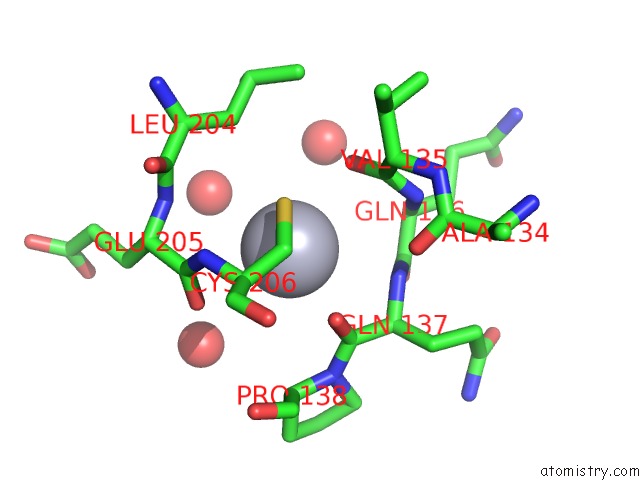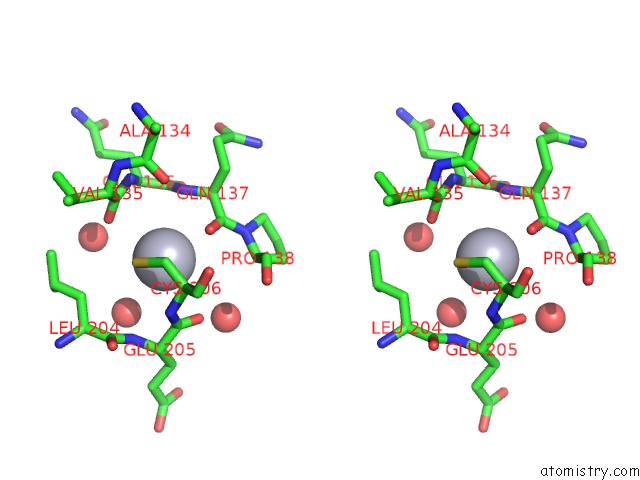Mercury »
PDB 1g52-1irk »
1if9 »
Mercury in PDB 1if9: Carbonic Anhydrase II Complexed with N-[2-(1H-Indol-5-Yl)-Butyl]-4- Sulfamoyl-Benzamide
Enzymatic activity of Carbonic Anhydrase II Complexed with N-[2-(1H-Indol-5-Yl)-Butyl]-4- Sulfamoyl-Benzamide
All present enzymatic activity of Carbonic Anhydrase II Complexed with N-[2-(1H-Indol-5-Yl)-Butyl]-4- Sulfamoyl-Benzamide:
4.2.1.1;
4.2.1.1;
Protein crystallography data
The structure of Carbonic Anhydrase II Complexed with N-[2-(1H-Indol-5-Yl)-Butyl]-4- Sulfamoyl-Benzamide, PDB code: 1if9
was solved by
B.A.Grzybowski,
A.V.Ishchenko,
C.-Y.Kim,
G.Topalov,
R.Chapman,
D.W.Christianson,
G.M.Whitesides,
E.I.Shakhnovich,
with X-Ray Crystallography technique. A brief refinement statistics is given in the table below:
| Resolution Low / High (Å) | 20.00 / 2.00 |
| Space group | P 1 21 1 |
| Cell size a, b, c (Å), α, β, γ (°) | 42.300, 40.800, 72.400, 90.00, 104.60, 90.00 |
| R / Rfree (%) | 15.6 / 21.6 |
Other elements in 1if9:
The structure of Carbonic Anhydrase II Complexed with N-[2-(1H-Indol-5-Yl)-Butyl]-4- Sulfamoyl-Benzamide also contains other interesting chemical elements:
| Zinc | (Zn) | 1 atom |
Mercury Binding Sites:
The binding sites of Mercury atom in the Carbonic Anhydrase II Complexed with N-[2-(1H-Indol-5-Yl)-Butyl]-4- Sulfamoyl-Benzamide
(pdb code 1if9). This binding sites where shown within
5.0 Angstroms radius around Mercury atom.
In total only one binding site of Mercury was determined in the Carbonic Anhydrase II Complexed with N-[2-(1H-Indol-5-Yl)-Butyl]-4- Sulfamoyl-Benzamide, PDB code: 1if9:
In total only one binding site of Mercury was determined in the Carbonic Anhydrase II Complexed with N-[2-(1H-Indol-5-Yl)-Butyl]-4- Sulfamoyl-Benzamide, PDB code: 1if9:
Mercury binding site 1 out of 1 in 1if9
Go back to
Mercury binding site 1 out
of 1 in the Carbonic Anhydrase II Complexed with N-[2-(1H-Indol-5-Yl)-Butyl]-4- Sulfamoyl-Benzamide

Mono view

Stereo pair view

Mono view

Stereo pair view
A full contact list of Mercury with other atoms in the Hg binding
site number 1 of Carbonic Anhydrase II Complexed with N-[2-(1H-Indol-5-Yl)-Butyl]-4- Sulfamoyl-Benzamide within 5.0Å range:
|
Reference:
B.A.Grzybowski,
A.V.Ishchenko,
C.Y.Kim,
G.Topalov,
R.Chapman,
D.W.Christianson,
G.M.Whitesides,
E.I.Shakhnovich.
Combinatorial Computational Method Gives New Picomolar Ligands For A Known Enzyme. Proc.Natl.Acad.Sci.Usa V. 99 1270 2002.
ISSN: ISSN 0027-8424
PubMed: 11818565
DOI: 10.1073/PNAS.032673399
Page generated: Sun Aug 11 00:03:07 2024
ISSN: ISSN 0027-8424
PubMed: 11818565
DOI: 10.1073/PNAS.032673399
Last articles
Zn in 9MJ5Zn in 9HNW
Zn in 9G0L
Zn in 9FNE
Zn in 9DZN
Zn in 9E0I
Zn in 9D32
Zn in 9DAK
Zn in 8ZXC
Zn in 8ZUF